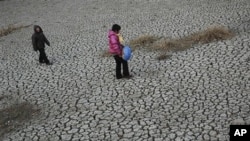A prolonged drought across much of China is threatening the country's wheat crop and could affect global food prices. Capital Beijing is among the regions badly affected by water shortages.
Beijing has not seen any rain or snow for a hundred days and the government warned the country Wednesday the drought does not look like it will end soon.
But the capital fares better than other areas suffering the worst drought in 60 years.
Shandong is a main agricultural producing province and sits in the heart of the country's eastern wheat belt, which grows 80 percent of the country's crop.
The government says farmers there are suffering from the worst drought in 300 years.
China’s drought control agency says more than five million hectares of crops have been damaged.
Millions of people in the east face severe drinking water shortages. The Water Resources Ministry says two-thirds of China’s cities are short of water.
Jonathan Watts, who has written extensively about the environmental effects of China’s modernization, says drought is not the only problem when it comes to water supplies in the country.
He says ever-increasing water demand in China has seen the natural water table and many lakes and rivers all but run dry. Pollution also has fouled many water sources.
But he says now the government seems willing to act and cut waste.
"The government has announced as a priority that it will double spending on water conservation and the next 10 years should see an improvement," said Watts. "It is not just finding new ways to increase supply but is actually about reducing the waste and perhaps even capping demand, and using water much more efficiently. This is really the way to go, and it seems like they are ready to do it."
The government has implemented an emergency response plan, putting parched areas on a 24-hour alert, dispatching experts and aid and ordering daily damage reports.
The dry spell prompted the United Nations World Food Program to warn Tuesday that China's wheat crop is now under threat.
Agricultural experts say this is bad news not only for China, but also for the world.
A poor harvest will see China import more grain, which could push up world prices, and adding soaring food inflation in many parts of the world.
China’s government is spending hundreds of millions of dollars on drought relief this year. And the government is building a system to pump water hundreds of miles from the wet south to the dry north.
State media reported Wednesday the Three Gorges Dam discharged millions of liters of water to assist areas down many miles down stream.
No End in Sight for China's Drought




